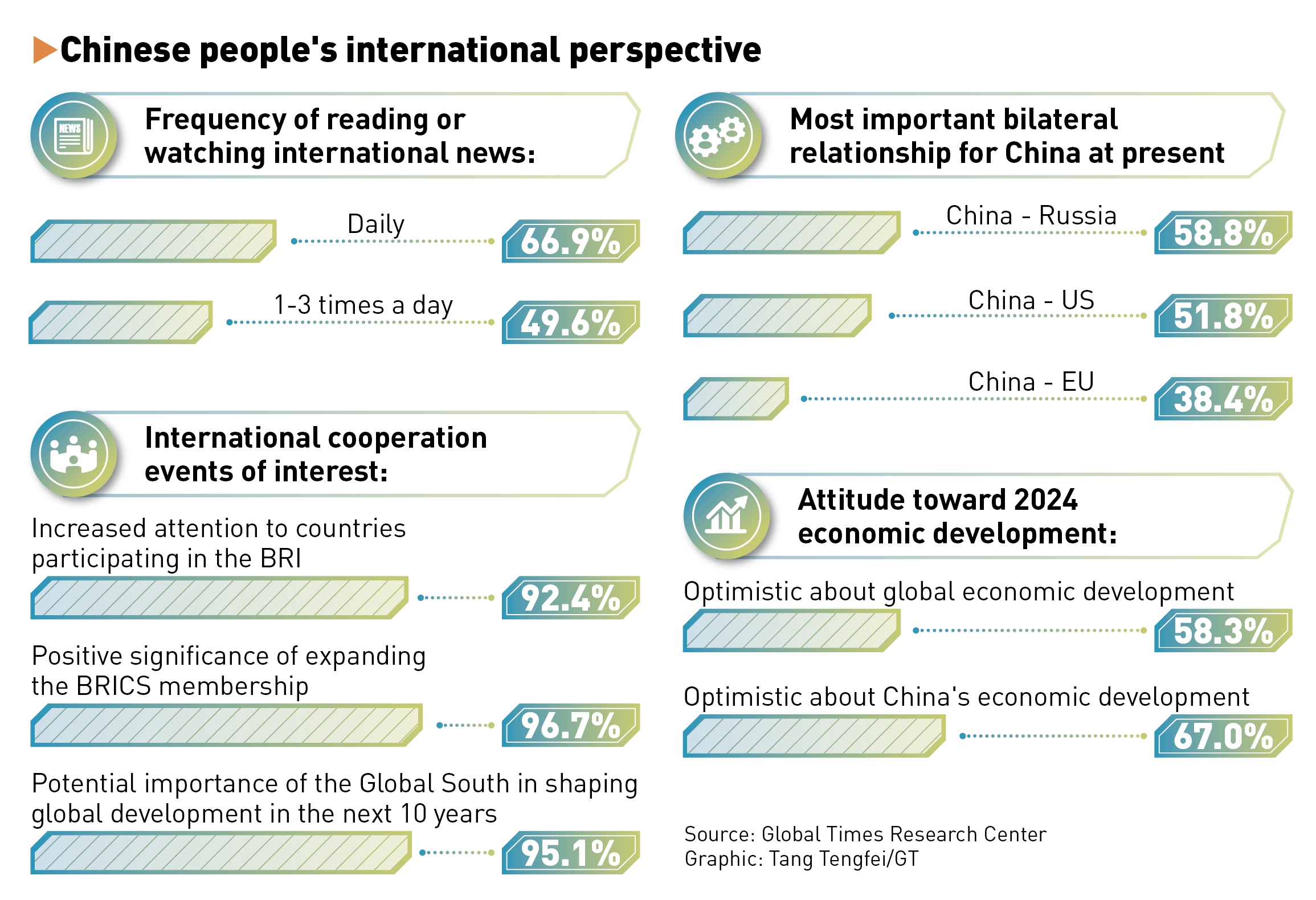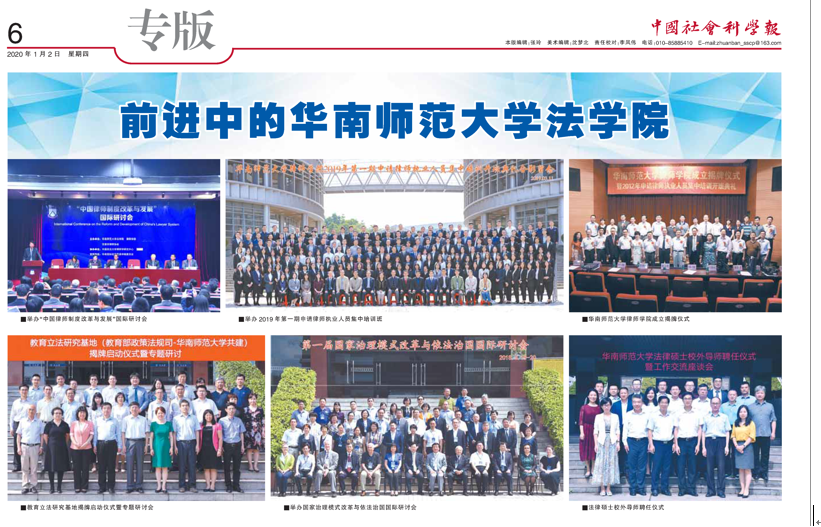
Likes
The year 2023 witnessed many changes in the international landscape and also saw more voices from the Global South on the global stage. It was also a year in which the US continued to forcefully impose its ideology on other countries, Japan's nuclear-contaminated wastewater dumping was internationally condemned, and the Palestine-Israeli conflict broke out, all posing diverse risks to global peace and stability. Conversely, in 2023, China made great strides in economic recovery and diplomacy, and unveiled significant technological breakthroughs.
In this year full of uncertainties, what was the common people's perspective on global issues? The Global Times Research Center recently conducted its 18th annual public opinion survey themed "How Chinese People View the World." Based on the survey results, China-Russia relations were considered to be the most important neighboring relationship for the fifth consecutive year. At the same time, nearly 90 percent of respondents believe that the US lacks sincerity in improving China-US relations, and more than half of the respondents believe that China should retaliate against US sanctions and targeted moves.
This is the second installment of the survey.

Graphic:GT
China-Russia relations rank top
The survey mainly collected data through online questionnaires using member invitations, and was conducted from December 4 to December 15, 2023. The survey sample covered 16 cities in the seven major regions of the Chinese mainland. The survey targeted ordinary Chinese citizens aged between 18 and 69. A total of 1,897 valid questionnaires were collected.
In response to the question "Among the following bilateral relationships, which three do you think are the most important for China at the current stage?" 58.8 percent of respondents chose "China-Russia relations," while "China-US relations" (51.8 percent) and "China-EU relations" (38.4 percent) ranked second and third respectively. China-Russia relations have ranked first for three consecutive years according to data.
In China's neighboring relations, those with Russia have been the most important for respondents for five consecutive years. This time, with a mention rate of 66.1 percent, it has become the most important neighboring relationship among respondents.
Additionally, the survey found that 63.3 percent of respondents expressed a desire for the improvement of China-Australia relations in a separate question. Nearly half (49.7 percent) of all respondents expressed hope for a relatively close and friendly relationship between China and Australia, and 13.5 percent hoped for a very close and friendly relationship.

Graphic: Deng Zijun/GT
US lacks sincerity in improving ties
In the survey, multiple questions were set regarding the China-US ties.
The survey result showed that 63.1 percent of the respondents expressed an unfavorable attitude toward the Biden administration. More than half of the respondents also held a negative view toward Republican and Democratic politicians at 55.3 percent and 53 percent respectively. The proportion of respondents who dislike the Biden administration increased by 3.3 percentage points compared with 2022. The percentage of respondents who dislike the American media reached 43.9 percent, an increase of 5.6 percentage points year-on-year, and the likeability rate was also less than 10 percent.
In recent years, the Biden administration has treated China as a strategic competitor and imposed restrictions on China in various areas such as technology and the economy. In this survey, 51.4 percent of the respondents believe that China should retaliate against the US. Nearly 90 percent of respondents expressed they believe that the US lacks sincerity in improving China-US relations.
Conversely, respondents still had a relatively favorable view of American film and television productions (48.5 percent) and sports leagues (41.9 percent), but both experienced a decrease in favorability of 11.2 and 8.6 percentage points respectively year-on-year.
The survey showed that when asked about their views on American democracy, freedom, and human rights in recent years, over three-quarters of respondents expressed a lack of support or a decrease of the same, an overall increase of 5.3 percentage points year-on-year. Regarding the performance of the US in the current Palestinian-Israeli conflict, 55.4 percent of the respondents said they believe it is irresponsible, 42.4 percent believe it is unethical, 38.9 percent believe it is unfair, and 36.4 percent believe that the US is hindering an early resolution to the Palestinian-Israeli conflict.
China actively promotes open, inclusive global cooperation
The "China's International Perspective" section of the survey reveals the Chinese public's views on the international situation. According to the survey data, 66.9 percent of respondents stated that they watch, read, or listen to international news daily, with 49.6 percent of respondents reporting a frequency of "1-3 times per day" in their exposure to international news.
Li Long, vice president of the Institute of Public Opinion and Social Governance at South China Normal University, told the Global Times that an increase in international news consumption reflects the increasing international vision of the Chinese people.
Currently, Chinese people are paying more attention to China's role and influence in international affairs. According to the survey, 92.4 percent of respondents believe that the Belt and Road Initiative (BRI) has increased attention paid to countries which participated in the initiative.
"The support of the Chinese people for their country's foreign policy helps to strengthen China's cooperative relationship with the countries participating in the BRI. It also enables the government to focus on the needs and opinions of the public while promoting fair and sustainable development in bilateral cooperation," said Li.
At the same time, 96.7 percent of the respondents agreed that the increase in the BRICS countries has a positive significance. In August 2023, during the 15th BRICS Summit, it was announced that Egypt, Ethiopia, Iran, Saudi Arabia, and the United Arab Emirates had been invited to join the BRICS cooperation mechanism. Their membership took effect on January 1.
The expansion of the BRICS countries will also further deepen the new type of globalization, experts pointed out, noting that the expansion process of the BRICS through including more countries has further strengthened the voice of the Global South. At a rate of 95.1 percent, respondents believe that the Global South may become an important force influencing the global development pattern in the next 10 years.
Currently, the global economy is stumbling forward and facing challenges. When asked about their expectations for the global economy over the next year, 58.3 percent of respondents were relatively optimistic, an overall increase of 6.7 percentage points compared with 2022. It is worth noting that 67.0 percent of respondents hold an optimistic attitude toward the future development of the Chinese economy in the next year, with 22.0 percent considering themselves to be "very optimistic" while 45.0 percent are "relatively optimistic."
China has a huge market demand and policy support in these industries, making it highly attractive to multinational companies. Looking ahead, China will create a better business environment to promote the quality and level of foreign investment utilization in our country, He said.
Source: https://www.globaltimes.cn/page/202401/1304596.shtml
What to read next:










